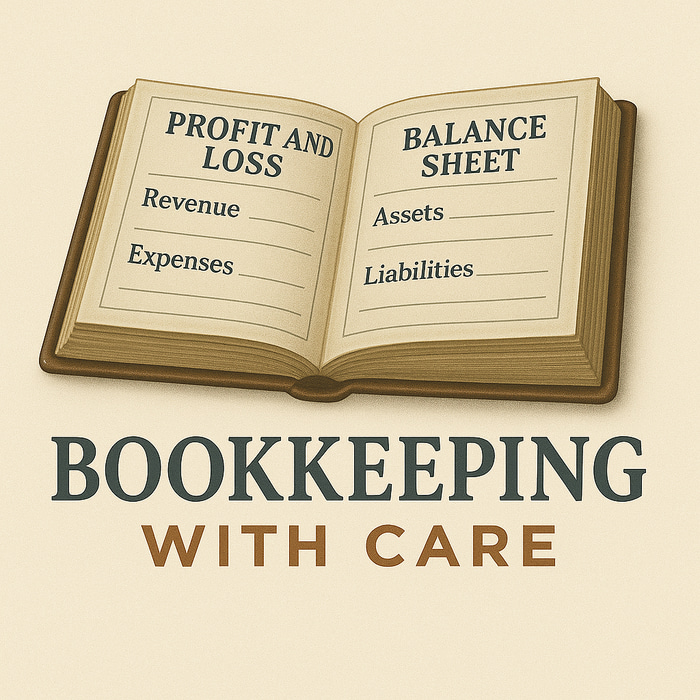call us now! we've got your back......0419 938 953 (located in perth but australia wide)
How AI Software Can Help Bookkeepers: Revolutionizing the Accounting Profession
4/29/20253 min read


How AI Software Can Help Bookkeepers: Revolutionizing the Accounting Profession
In today's fast-paced business world, technology is transforming the way professionals in every field work. For bookkeepers, the rise of artificial intelligence (AI) has brought about significant improvements in efficiency, accuracy, and decision-making. AI software is making the bookkeeping process faster, more accurate, and less labor-intensive, allowing bookkeepers to focus on more strategic tasks while also offering better service to their clients.
1. Automated Data Entry
One of the most time-consuming tasks for bookkeepers is data entry. Manually entering invoices, receipts, and other financial transactions can be tedious and prone to human error. AI-driven bookkeeping software automates much of this process by extracting data from documents and inputting it into the appropriate financial records.
For instance, AI tools like Optical Character Recognition (OCR) can scan invoices and receipts, pulling the relevant data such as date, amount, vendor, and description, then categorizing the transaction. This eliminates the need for bookkeepers to manually input these details, reducing the risk of errors and saving time.
2. Expense Tracking and Categorization
AI software can help bookkeepers streamline expense management by automatically categorizing and tracking expenses in real-time. Rather than sifting through hundreds or thousands of transactions, AI can recognize patterns in spending and assign the correct category to each transaction. For example, it can automatically distinguish between utility bills, office supplies, or client expenses, ensuring accurate bookkeeping without the need for manual oversight.
This level of automation allows bookkeepers to save valuable time and improve the accuracy of their financial records.
3. Bank Reconciliation Made Easy
Reconciling bank statements is a critical but often tedious part of bookkeeping. AI software can automatically match transactions in the accounting system with those in the bank statement. It identifies discrepancies between the two sets of data and highlights any transactions that need further attention, allowing bookkeepers to resolve issues quickly.
AI also offers predictive reconciliation, which can suggest potential matches based on historical transaction patterns. This feature significantly reduces the time spent on manual reconciliation and helps ensure that financial records are always up-to-date.
4. Real-Time Financial Insights
AI can offer bookkeepers real-time financial insights that were once difficult to obtain without extensive analysis. By using machine learning algorithms, AI software can track financial trends, identify anomalies, and provide actionable insights. For example, it can highlight areas where a business may be overspending, or where there are opportunities for tax deductions.
This not only helps bookkeepers stay ahead of potential issues but also allows them to provide more strategic advice to their clients, making them more valuable partners in business growth.
5. Financial Forecasting
AI can also play a key role in financial forecasting. By analyzing historical data and identifying trends, AI tools can help bookkeepers predict future cash flow, sales, and expenses. These insights are incredibly valuable for businesses planning for the future, as they provide a more accurate understanding of financial health and potential challenges.
With AI-driven forecasting, bookkeepers can offer their clients data-driven predictions, helping them make informed decisions about investments, expenses, and other financial matters.
6. Compliance and Taxation
Compliance with tax laws and regulations is one of the most important responsibilities of a bookkeeper. AI software can assist by keeping track of changing tax laws and ensuring that a business’s records are always up-to-date. AI can automatically apply the correct tax rates to transactions, generate tax reports, and even flag potential discrepancies or errors before they become problematic.
This reduces the risk of human error and ensures that bookkeepers can focus on more value-added tasks, such as advising clients on ways to reduce their tax liability.
7. Enhanced Client Communication
AI software can also improve the way bookkeepers communicate with clients. Automated reporting tools can generate financial reports at regular intervals, providing clients with up-to-date insights into their financial status without the need for manual input from the bookkeeper.
Additionally, AI-driven chatbots can assist with answering client queries, providing quick responses to routine questions about invoicing, payments, or account balances. This ensures that clients are always kept in the loop, improving customer satisfaction and reducing the workload for bookkeepers.
8. Improved Fraud Detection
Fraud is a constant concern in the financial world, and AI is helping bookkeepers mitigate this risk. AI systems can detect unusual patterns of behavior, such as large, uncharacteristic transactions or unauthorized access to financial accounts. By flagging these anomalies, AI helps bookkeepers catch potential fraudulent activity before it becomes a major issue.
This real-time detection is crucial in ensuring the integrity of financial records and maintaining trust with clients.
Conclusion
AI software is revolutionizing the way bookkeepers handle their responsibilities, offering tools that automate routine tasks, improve accuracy, and provide valuable financial insights. By embracing AI, bookkeepers can save time, reduce errors, and offer enhanced services to their clients.
As the technology continues to evolve, we can expect even more advanced AI tools that will further transform the bookkeeping profession, making it not only more efficient but also more strategic. For bookkeepers, adopting AI is no longer just a trend—it’s an essential step towards future-proofing their practice and delivering better value to their clients.
Services
Expert bookkeeping for Australian businesses to support business stability and compliance. We are located in Perth however are able to assist any business Australia wide.
ABN: 81 592 027 628
Stability - compliance
handled with bookkeeping Care
marg@bookkeepingwithcare.com.au
+61-419 938 953
© 2025. All rights reserved.
